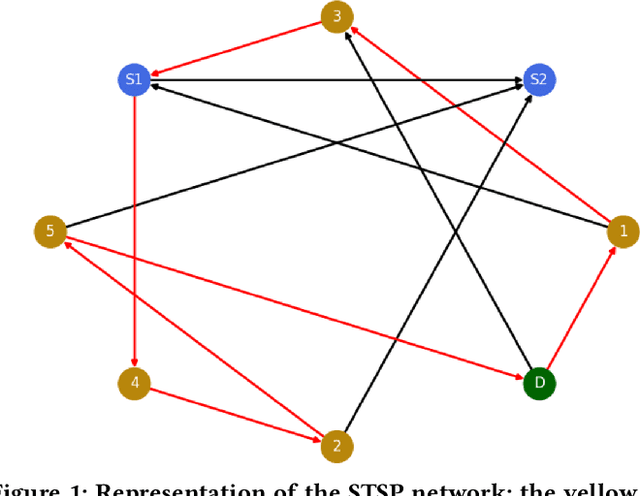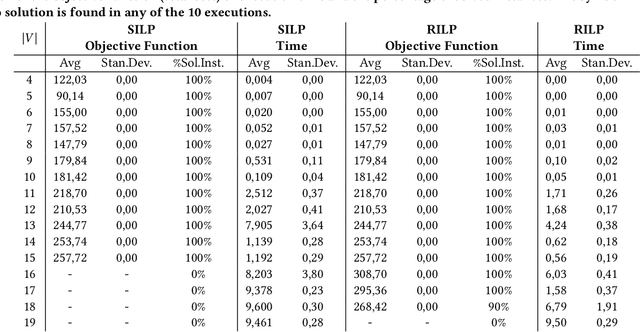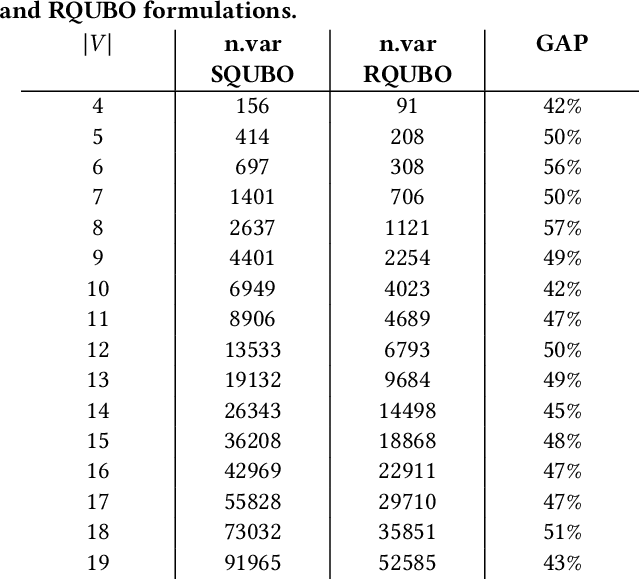Francesca Guerriero
Steiner Traveling Salesman Problem with Quantum Annealing
Apr 03, 2025



Abstract:The Steiner Traveling Salesman Problem (STSP) is a variant of the classical Traveling Salesman Problem. The STSP involves incorporating steiner nodes, which are extra nodes not originally part of the required visit set but that can be added to the route to enhance the overall solution and minimize the total travel cost. Given the NP-hard nature of the STSP, we propose a quantum approach to address it. Specifically, we employ quantum annealing using D-Wave's hardware to explore its potential for solving this problem. To enhance computational feasibility, we develop a preprocessing method that effectively reduces the network size. Our experimental results demonstrate that this reduction technique significantly decreases the problem complexity, making the Quadratic Unconstrained Binary Optimization formulation, the standard input for quantum annealers, better suited for existing quantum hardware. Furthermore, the results highlight the potential of quantum annealing as a promising and innovative approach for solving the STSP.
Optimal In-Network Distribution of Learning Functions for a Secure-by-Design Programmable Data Plane of Next-Generation Networks
Nov 27, 2024



Abstract:The rise of programmable data plane (PDP) and in-network computing (INC) paradigms paves the way for the development of network devices (switches, network interface cards, etc.) capable of performing advanced computing tasks. This allows to execute algorithms of various nature, including machine learning ones, within the network itself to support user and network services. In particular, this paper delves into the issue of implementing in-network learning models to support distributed intrusion detection systems (IDS). It proposes a model that optimally distributes the IDS workload, resulting from the subdivision of a "Strong Learner" (SL) model into lighter distributed "Weak Learner" (WL) models, among data plane devices; the objective is to ensure complete network security without excessively burdening their normal operations. Furthermore, a meta-heuristic approach is proposed to reduce the long computational time required by the exact solution provided by the mathematical model, and its performance is evaluated. The analysis conducted and the results obtained demonstrate the enormous potential of the proposed new approach to the creation of intelligent data planes that effectively act as a first line of defense against cyber attacks, with minimal additional workload on network devices.
A biased random-key genetic algorithm with variable mutants to solve a vehicle routing problem
May 01, 2024Abstract:The paper explores the Biased Random-Key Genetic Algorithm (BRKGA) in the domain of logistics and vehicle routing. Specifically, the application of the algorithm is contextualized within the framework of the Vehicle Routing Problem with Occasional Drivers and Time Window (VRPODTW) that represents a critical challenge in contemporary delivery systems. Within this context, BRKGA emerges as an innovative solution approach to optimize routing plans, balancing cost-efficiency with operational constraints. This research introduces a new BRKGA, characterized by a variable mutant population which can vary from generation to generation, named BRKGA-VM. This novel variant was tested to solve a VRPODTW. For this purpose, an innovative specific decoder procedure was proposed and implemented. Furthermore, a hybridization of the algorithm with a Variable Neighborhood Descent (VND) algorithm has also been considered, showing an improvement of problem-solving capabilities. Computational results show a better performances in term of effectiveness over a previous version of BRKGA, denoted as MP. The improved performance of BRKGA-VM is evident from its ability to optimize solutions across a wide range of scenarios, with significant improvements observed for each type of instance considered. The analysis also reveals that VM achieves preset goals more quickly compared to MP, thanks to the increased variability induced in the mutant population which facilitates the exploration of new regions of the solution space. Furthermore, the integration of VND has shown an additional positive impact on the quality of the solutions found.
 Add to Chrome
Add to Chrome Add to Firefox
Add to Firefox Add to Edge
Add to Edge